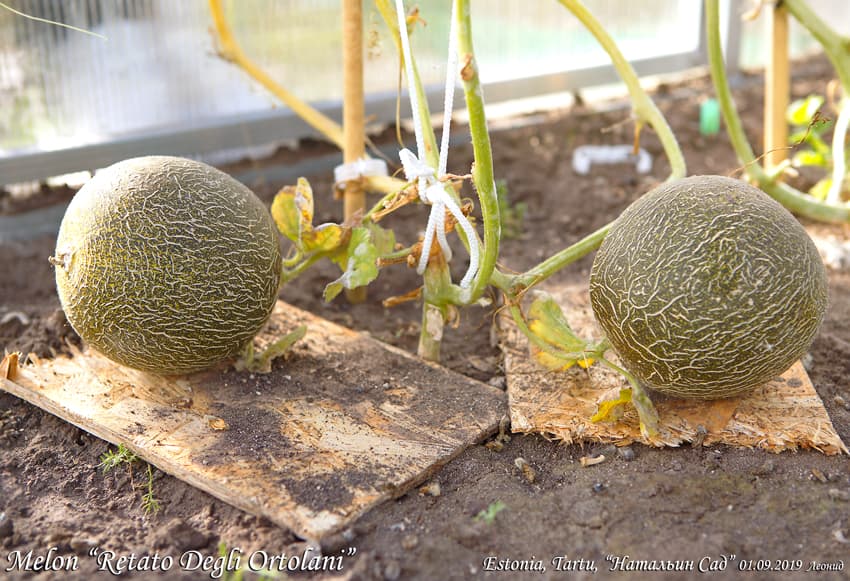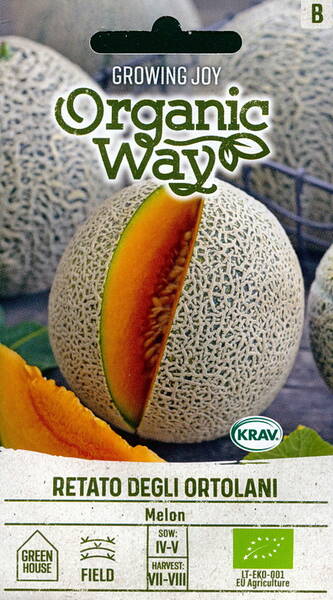Ex Tax: 0.90€
A classic Italian cantaloupe-type melon.
An annual plant of the pumpkin family. Warm, light and moisture-loving. The optimal temperature for the growth and development of melon is +25+35°C. It is grown only through seedlings, which require 12 hours of daylight and a temperature of +25°C, and is subsequently grown in closed ground or on heated beds. After planting the seedlings in a permanent place, the plant is formed: the main shoot is shortened over the 2-3rd leaf, the side shoots - over the 6th. Two leaves are left above the ovary the size of a walnut. Non-fruiting canes are removed. The fruits are placed in a net or stocking and tied to a support. Melons are harvested in late summer or early autumn. At temperatures below +15°C, plant growth stops. Does not tolerate frost. Seed sowing depth - 2 cm. Distance between plants - 50 cm. Distance between rows - 50 cm.
Sowing seedlings: March-April.
Planting seedlings: May-June.
Cleaning: August-September.

Melon. Bot. syn.: Melo sativus.
* Since time immemorial, melon has been widely used in folk medicine of many peoples of the world as a medicinal plant.
The renowned ancient physicians Pliny the Elder and Paracelsus used it to treat a wide variety of ailments. And medieval Arabs considered the melon one of the fruits of paradise, from where it was supposedly brought to earth by an archangel.
In terms of nutrient content, melon is similar to watermelon. It contains up to 16-18% or more sugars (primarily sucrose), up to 30 mg% vitamin C, folate, carotene, pectin and extractive substances, and various aromatic compounds. Melon also has a fairly rich mineral composition. It contains a lot of potassium – 120 mg% – and iron – up to 2 mg%, which is 10-15 times more than milk and twice as much as chicken.
Thanks to its significant content of iron, folate, niacin, and vitamin C, melon is beneficial for liver disease, anemia, and overall vitality. Melon is especially beneficial for those with debilitating conditions, the elderly, those with cerebrovascular sclerosis, and cardiovascular disease, and it alleviates mental disorders.
Melon has a significant diuretic effect and is used in folk medicine to cleanse the urinary system and treat urolithiasis. This treatment involves regularly including 1.5-2 kg of melon in the daily diet, 3-4 times a day, between meals, throughout the season. This results in a sharp increase in urine output, cleansing the kidneys and urinary tract, and removing sand and small stones. However, all this only occurs with regular and long-term consumption of melon. Those suffering from gout and rheumatism should also pay attention to this property of melon pulp.
Melon pulp has a strong antihelminthic effect. To expel worms, drink one glass of melon juice in the morning on an empty stomach until completely cured. This method is especially suitable for children, as it is tasty, completely harmless, and rich in vitamins.
For constipation, melon is taken on an empty stomach in unlimited quantities, and for excess weight and obesity, melon juice is especially useful in combination with apple and tomato juice in a ratio of 1:2:1.
Melon is beneficial for children due to its content of easily digestible iron salts, which improve the body's redox processes. Melon promotes recovery from colds, is beneficial for pulmonary tuberculosis, and helps relieve the symptoms of acute hemorrhoids.
Melon seeds are no less medicinally valuable. Yes, those same seeds we so thoughtlessly throw away. For kidney disease, a melon seed infusion is used as a diuretic. To prepare it, pour 1 tablespoon of dried seeds into 1 cup of boiling water, let steep in a warm place for 3 hours, and strain. Take 0.5 cups of the infusion 4-5 times a day. Melon milk is used for kidney stones, urinary tract irritation, and coughs. To prepare it, thoroughly grind dried melon seeds in a blender or mortar, gradually adding warm boiled water in a ratio of 1:8, and grind until milky. Then strain the mixture and add sugar to taste. The resulting "melon milk" is taken 0.25 cups 5-6 times a day, 30 minutes before meals. It increases urine output, has a healing effect on the kidneys and urinary tract, and eliminates the burning sensation during urination associated with certain illnesses.
If you boil 1 tablespoon of melon seeds in 1 cup of milk and let it steep for 30-40 minutes at room temperature, you'll have a remedy that alleviates urinary retention. This property of melon seeds should be of particular interest to men with prostate problems.
Ancient Eastern medicine recommends taking 1 teaspoon of peeled and crushed melon seeds for quick relief from constipation and to increase milk production in nursing mothers.
An infusion of finely ground melon seeds is used to lower blood sugar levels. To prepare it, pour 1 tablespoon of melon seed flour into 1 cup of boiling water and let it steep at room temperature until completely cool. Take 1 cup of the resulting infusion 3 times daily before meals.
Melon is a good dietary product, beneficial for exhausted and elderly people. Its pulp is completely harmless and can be consumed without any dosage. However, consuming large quantities of melon at one time is not recommended, as it can overload the stomach, causing colic and diarrhea.
Including fresh and dried melon in the diet of pregnant women is beneficial for anemia, constipation, hemorrhoids in the postpartum period, etc.
Melon is contraindicated for those with diabetes, certain stomach conditions, and breastfeeding mothers. It should not be consumed with alcoholic beverages or cold water, as this may cause intestinal colic and diarrhea.
Melon is widely used in cosmetics. A mask made from crushed melon pulp nourishes and tones the skin of the face and lips. With regular use for one month, the skin becomes smooth and elastic. Regularly washing with a cooled decoction of the seeds has a rejuvenating effect on the skin, giving it a delicate whiteness. To prepare it, pour 1 tablespoon of crushed seeds into 1 cup of boiling water, simmer over low heat for 3-4 minutes, cool to room temperature, and strain.















